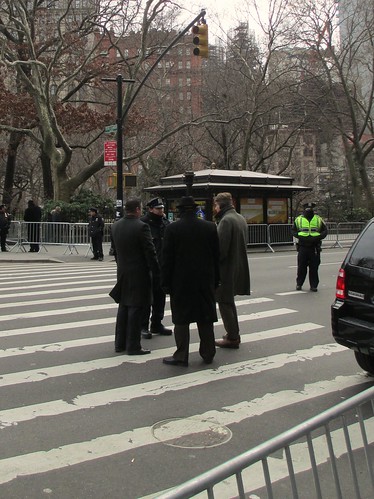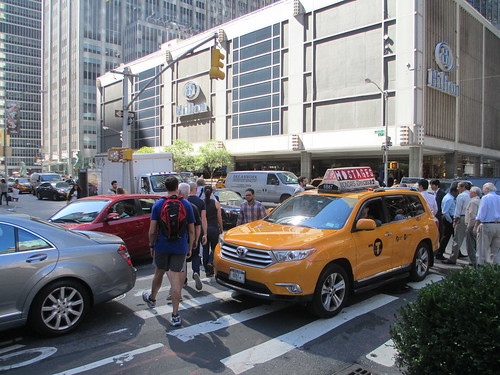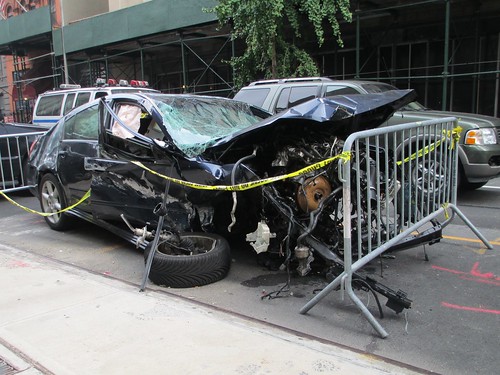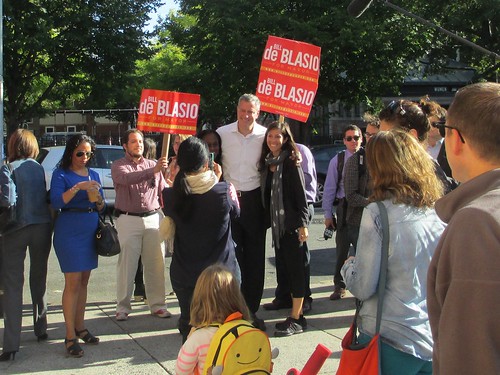William Bratton,
Commissioner,
New York Police
Department,
1 Police Plaza,
NY 10038
January 19, 2014
Dear Commissioner Bratton,
Vision
Zero and Statistics
Congratulations
on your appointment as NYPD commissioner. Like many New Yorkers, I feel optimistic
based on most of your public statements that you’re determined to build on the
progress made on public safety in your previous term at the department. I am
particularly optimistic that you are determined, at last, to set about reducing
the appalling toll of death and injury that motor vehicles exact from New
Yorkers every year.
I wanted to pick you up, however, on a puzzling
statement on January 15 at the launch press conference for the mayor’s Vision Zero initiative. You said
pedestrians contributed to causing 73 per cent of pedestrian-motor
vehicle collisions last year and that pedestrian actions were directly
responsible for 66 per cent of those collisions. It’s a figure that on my
reading of the figures is demonstrably incorrect. I fear that, if the NYPD genuinely thinks this
figure reflects reality, it could seriously distort the department’s efforts to
reduce the grim toll of unnecessary suffering on our city’s streets.
 |
| Waiting for a new boss: NYPD officers outside the new mayor's inauguration |
I would be
interested to know the basis for your assertion – and grateful if you could put
the figure right if, as I am sure it is, it is mistaken.
Your
figure is implausible to start with. It implies that motorists - who stand
almost no chance of injury in a collision with a pedestrian, often drive at
high speed and are easily distracted – are more solicitous of pedestrians’
safety than the pedestrians themselves. That seems at variance with my experience of human nature as well as with my observation that pedestrians are
generally watchful when crossing city streets and motorists often cavalier when
driving on them.
The
statistic is also starkly at odds with all the research I’ve read either in New York or elsewhere on
the causes of crashes between motor vehicles and vulnerable road users –
pedestrians and bicyclists. For example, a study published in 2013 by NYU Langone Medical Center found that 44 per cent of pedestrians treated for injuries after collisions had
been hit in a crosswalk while crossing with the light. Another 6 per cent were
hit on the sidewalk. Given that some of the other victims will also have been
the victims of driver negligence – hit in unsignalised crosswalks, for example –
it is clear the majority of studied crashes were mainly drivers’ fault.
 |
| Typically dangerous pedestrian behaviour: midtown Manhattan |
A
more comprehensive study, published in 2010 by the city’s own Department of Transportation, attributed blame for 36 per cent of crashes that killed or seriously injured
pedestrians to driver inattention. It attributed another 27 per cent to
motorists’ failure to yield and said vehicle speed was a major contributor to
21 per cent of crashes. The DoT study reinforces the impression that, while
pedestrians undoubtedly cause some crashes, they are probably mainly to blame
for only a quarter or so of incidents.
Around
the world, a number of research studies have reached strikingly similar
conclusions. Many have attributed blame for crashes involving pedestrians and
cyclists to motorists in around 75 per cent of cases. For example, in London , where I lived and cycled for nine years until
August 2012, a Transport for London
study of every reported motorist-cyclist collision in 2010 attributed blame for around 74 per cent of the crashes to motorists. Motorists’
inattentiveness, excessive speed and impatience are the main killers in every
industrialised country of which I’m aware. It's unlikely New York City is a freakish exception.
 |
| It might look to you like the outcome of negligent speed: but there's an NYPD statistician who probably thinks some pedestrian caused this. |
Your
assertion also seems at odds with the evidence of the fatal crashes involving
pedestrians so far this year. I’ve been able to glean enough information about
four of the fatal pedestrian crashes up until Friday 17 to guess how blame
might be allocated. In only one – the death of Xiaoci Hu, killed on January 2
when a car ran into the back of another car that had slowed down to let him
cross mid-block – does the pedestrian appear to have carried even a portion of
the blame. The driver who struck Mosa Khatun on January 5 in Jamaica was
charged with failure to yield; the driver who hit Nydja Herring on January 11
in Parkchester has reportedly been charged with aggravated driving while
intoxicated; numerous witnesses attest that the driver who killed Cooper Stock
on January 11 hit him and his father in a crosswalk as they crossed with the
light.
Streetsblog,
the campaigning website, calculates your department coded only between 7 and 8 per cent of crashes involving pedestrians or cyclists in the first 11 months last year as having resulted from pedestrian or cyclist confusion or error.
My
concern is that a mistaken understanding of the present crisis’ causes could
lead the NYPD to pursue mistaken or counterproductive measures to halt it. If
pedestrian behaviour were indeed the cause of most pedestrian/car crashes, it
would be worthwhile and effective to work harder at changing pedestrian
behaviour. I note there are already reports of a police crackdown on
“jaywalking” around the area on 96th
street in Manhattan
where there has been a cluster of casualties this year. I can imagine it will
be tempting for local police precincts to seek in any crackdown to tackle
pedestrians and cyclists since they are, by their nature, easier to catch and
prosecute than drivers of fast-moving cars.
If,
however, cars cause the majority of crashes involving pedestrians and cyclists,
it will make far more sense to work at controlling drivers’ speed and ensuring
they yield when required to do so. I am worried that, with the crackdown on the
Upper West Side , you are beginning to pursue a
pedestrian-focused strategy – one that targets the victims and not the perpetrators.
 |
| The new mayor during his campaign: before he had a police commissioner to explain how pedestrians were killing themselves |
My
personal conviction is that a concerted effort to tackle the traffic crisis’
real causes could yield dramatic results quickly. During my nine years in London , I covered transport issues in the UK and
elsewhere for the Financial Times, winning several awards. London ,
which has a similar population to New York ’s
and similar traffic volumes, suffers only half the annual traffic fatalities that New York does. Motorists’ adherence to speed limits and other road rules is noticeably
more lax in New York City than in London . I see no reason
why the introduction to New York of systematic
speed enforcement and a general culture of respect for road rules should not
quickly bring New York ’s fatality levels
closer to London ’s.
I
look forward to hearing from you about your figure’s origin and how it is affecting
your policies. I would of course be delighted to speak with you or your
officials about my concerns.
The NYPD and
other city agencies have it within their grasp to save hundreds of New Yorkers’
lives every year. It would be a tragedy if apparently mistaken data led you to
pass that opportunity up,
Yours
Sincerely,
Well said. One observation - in New York, the police are far more likely to be motorists than are the London police. Hence the greater leniency towards "their own kind" as shown by the new commissioner. You often see the trend in newspaper crash report comments. Let's leave it at that.
ReplyDeleteI doubt that London police are less likely to be motorists than their NYC counterparts. My experience is that most police officers either live outside of London in dormitory towns where car ownership is almost compulsory, or have moved to London from such towns and bring their prejudice with them.
DeleteSteve,
DeleteI think the culture about where police officers live in London and New York is pretty similar. In New York, they live in the Long Island suburbs, New Jersey and Staten Island. In London, at least by reputation, it tends to be Essex, Surrey and Hertfordshire. All of these areas are fairly car-dependent.
It's not really the case, either, that the various London police forces' attitudes to these issues are significantly more enlightened about traffic issues than their counterparts in New York (I recorded a few of my London experiences here: http://invisiblevisibleman.blogspot.com/2012/06/cops-pedallers-and-why-theyre-picking.html). The big difference is that the UK has plentiful speed and traffic light cameras to automate enforcement of some of the most important rules. Also, while many UK police investigations of traffic incidents and their subsequent prosecution are grossly inadequate, there's an expectation that at least something will happen after a fatal crash and that the charge will be something more severe than the minor "failure to yield" ticket that the NYPD habitually hands out.
All the best,
Invisible.
Good letter. I hope you send it to the NY Times and a few other high visibility places.
ReplyDeleteKhal,
DeleteThanks for your kind words. Obviously, given that I work for a rival, it's a bit tricky for me to push the letter to the NYT. But I plan to send a paper copy of the letter to Commissioner Bratton, and modified versions of the letter to other public officials involved. I hope it might make at least some difference.
Invisible.
If you want to look at an overreaction by NYPD from these mistaken statistics, look no further than the elderly man that they bloodied and arrested for jaywalking (and presumably resisting arrest). http://nypost.com/2014/01/19/cops-beat-elderly-man-after-he-jaywalked/
ReplyDeleteGneiss,
DeleteThank you. Yes, I was aware of the jaywalking beating as I wrote. I really am concerned that the NYPD are going to take Vision Zero as an excuse to pick on pedestrians. I hope that the airing now of an alternative analysis might help to bring about a change of course before it's too late.
All the best,
Invisible
There appears to be a little mishap in the beginning of the article, some text has been moved around, see "January 15 at..."
ReplyDeleteDmitri,
DeleteThanks. I don't know what went wrong but it's been put right now.
Invisible.
The belief that non-motorists are by far the major cause of crashes is very commonly held, despite all evidence to the contrary. Not sure how we can address that problem.
ReplyDeleteIan,
DeleteI guess one just has to hope that regular airing of the facts makes a difference.
Invisible.
Perhaps the good commissioner should watch the ads described at http://dfwptp.blogspot.com/2014/01/bad-ads.html?m=0
ReplyDeleteGood, level article. Needs an edit before you send to any papers or commissioners.
ReplyDeleteHenry,
DeleteThank you. Given that I spend all week writing 450-word and 700-word articles for one of the world's leading newspapers, I guess I let my hair down a little when writing a blogpost hastily on a Sunday evening.
Invisible.
I truly hope this is just one of those "breaking in" mishaps, and that the future will be brighter. After all, even Bloomberg took a while to warm up to the idea of bike infrastructure and pedestrian plazas.
ReplyDeleteI don't even live in New York City or the USA, but I think when major cities like NYC become more liveable, all of us living in smaller and less significant cities get ammunition in our fight for liveable streets.
Dmitri,
DeleteI sincerely hope you're right - but I'm sincerely concerned that the New York Police Department's culture is a real mess on this kind of subject.
Invisible.
This seems like a job for Edward Tufte - the man who explained how faulty data and lousy powerpoint charts led to the Challenger disaster. Perhaps he could fashion some straightforward charts demonstrating causes of death of NYC pedestrians and cyclists. Paging Edward Tufte, job for Edward Tufte...
ReplyDeleteVannevar,
DeleteI think Mr Tufte might find that many senior people in the NYPD just know things without having to go through the tiresome business of looking at statistics and so on...
Invisible.
As I labor to promote Safe Routes to School programs (and how offensive that we have to have special programs to do such a no-brainer kind of thing), I am aware that for children getting to school in NYC, they often risk their lives by just obeying the law. How sad -- and something I intend to explore with the young people at the Youth Bike Summit there in Feb.
ReplyDeleteSouthLakes,
DeleteYou're quite right that there should be far safer routes to school.
The city looks forward to hosting you.
Invisible.
As one of the terrible, awful scofflaws who got one of the jaywalking tickets, I appreciate your posting this and questioning where the Commissioner got that 73% statistic, as I'm trying to figure out what I have to contend with. For the record, here's what the NYS vehicle and traffic law has to say about jaywalking:
ReplyDelete§ 1152. Crossing at other than crosswalks. (a) Every pedestrian
crossing a roadway at any point other than within a marked crosswalk or
within an unmarked crosswalk at an intersection shall yield the right of
way to all vehicles upon the roadway.
(b) Any pedestrian crossing a roadway at a point where a pedestrian
tunnel or overhead pedestrian crossing has been provided shall yield the
right of way to all vehicles upon the roadway.
(c) No pedestrian shall cross a roadway intersection diagonally unless
authorized by official traffic-control devices; and, when authorized to
cross diagonally, pedestrians shall cross only in accordance with the
official traffic-control devices pertaining to such crossing movements.
Moonbat,
DeleteI'm really sorry you got ticketed. You'll have gathered I don't think this is the right way to proceed.
For what it's worth, I've heard many good things about the prowess of Steve Vaccaro, of Vaccaro & White, with such cases, should you feel like challenging the ticket.
As for the law, what strikes me is that "jaywalking" seems to be an offence only if you actually obstruct a vehicle (if I'm reading correctly). So just nabbing everyone who crosses against the light or mid-block seems dubious to me.
I hope you get the ticket rescinded.
All the best,
Invisible.
Invisible, a lovely coherrent letter. Maybe in a free moment you may care to write to Nikki Sinclair (MEP) for her recent comments on cyclist registration.
ReplyDeleteThe NYPD has a vested interest in blaming pedestrians for crashes whilst ignoring driver recklessness. It's all about the cost of prosecuting motorists. Obviously, a large proportion of these vehicle related deaths are crimes. Involuntary manslaughter fits the bill perfectly. If the NYPD treated them as they treat non-vehicular crimes, they would have a crime epidemic on their hands. of course they do have a crime epidemic on their hands, but by claiming they're not crimes (by some twisted logic that says it's not a crime to kill someone if you're behind the wheel) then they save themselves a considerable amount of money because they don't have to carry out a proper investigation.
ReplyDeleteEvery time the DA's office is quizzed about its refusal to prosecute killer drivers, they wheel out the same old "it's too hard to get a conviction" excuse. Yet in the case of non-vehicular crimes, the perceived difficulty of a conviction is never considered as a factor when bringing charges. If it's a case of financial fraud, no stone is left unturned in sifting through hundreds of thousands of documents and emails and financial records to get a conviction. If it's an unsolved murder, they'll beaver away for 30 years to get a conviction if that's what it takes. Every shred of evidence is procured and gone over with a fine tooth comb. If it's a workplace related death with gross negligence as a possible cause, no expense is spared in carrying out forensics, examining and testing machinery, analyzing witness statements and poring over hours of video footage.
When a reckless cab driver barrels around a corner, fails to yield and kills a child, then all of a sudden gross negligence is "too hard to prove" and they declare no criminality. A thorough investigation would involve seeking out security camera footage, measuring skid marks, performing vehicle forensics and taking witness statements as evidence. But unlike the case of non-vehicle crimes, witness statements aren't even considered evidence by the NYPD. When a young French woman was sliced in two by a non-yielding garbage truck on the UES a few years ago, various witnesses at the scene said he was speeding and I recall one even said he was going "like a bat out of hell." It wouldn't have been too difficult to prove. The extent of her injuries prove beyond doubt that he took the corner way too fast. Yet they didn't charge him with anything in relation to her death, opting instead for the usual relatively trivial charge of "operating a vehicle on a suspended license" which has nothing to do with the homicide.
If the NYPD were forced to investigate vehicular homicides in the same way they investigate any other homicides, they'd have a massive workload on their hands and this is why they will do or say anything to avoid it. Taking on this workload would mean they would have to divert resources from the kind of police work they enjoy more, like for instance arresting and jailing people for minor drug offenses.
"Jaywalking" is a peculiarly USA aberration ( Though I think it has been exported to one or two other places)
ReplyDeleteAIUI, it was a result of deliberate motor-lobby pressure in the 1930/40's period.
It's crap.
Here (UK) & most of Europe, no such insanity prevails.